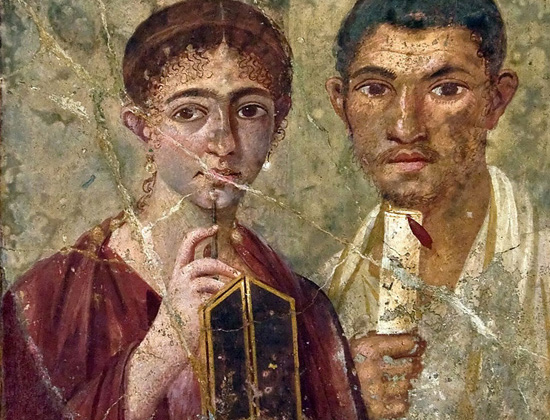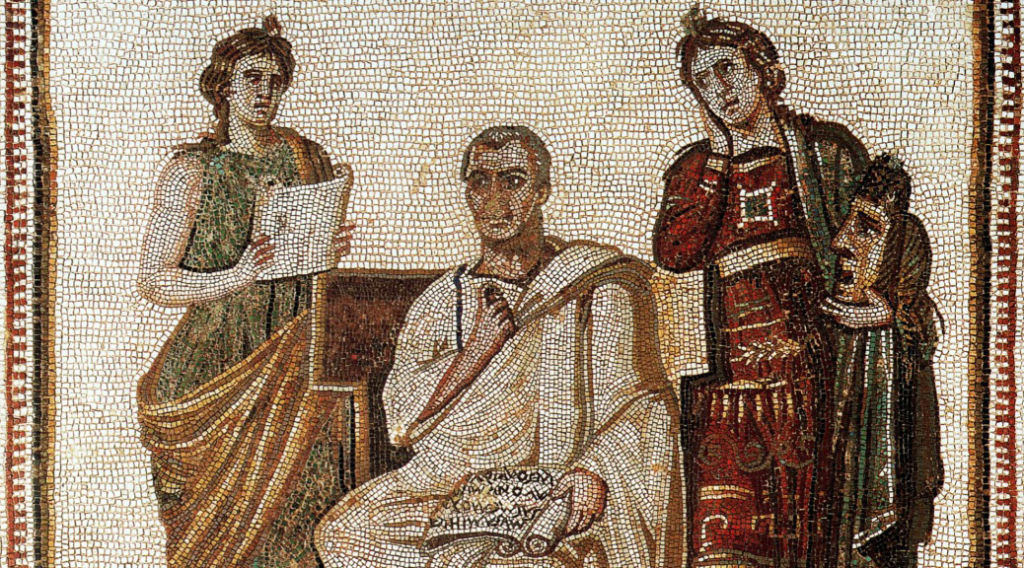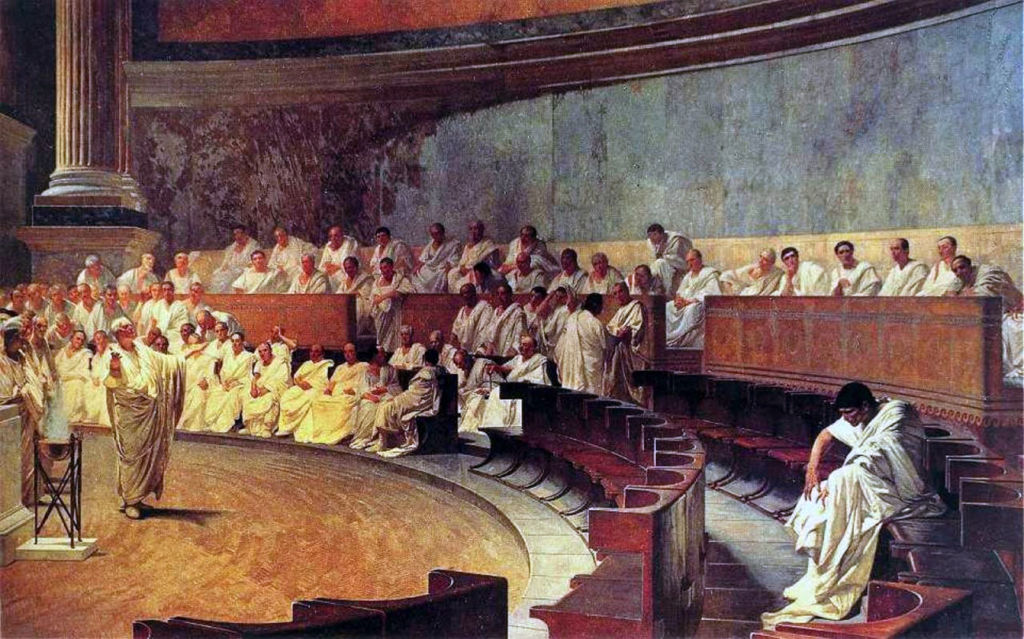Scholae latinae: online Latin course
Non […] tam praeclarum est scire Latine quam turpe nescire.
Cicero, Brutus, 140.
In April we’ll continue our series of courses of Latin and Greek. They’ll be followed by other courses in July (both online and in person) and in October.
For now, you can register for the following courses (which have a limited number of participants):
Latin language: elementary (A1, A2), intermediate (B1, B2 and B3) and advanced level (C1.1 and C1.2);
Latin metrics: for students at advanced level (C1 and C2);
Latin rhetoric: for students at advanced level (C1 and C2);
Christian Latin literature: for students at advanced level (C1 and C2);
Medieval Latin literature: for students at advanced level (C1 and C2);
Latin literature of the Renaissance: for students at advanced level (C1 and C2);
Modern science in Latin: for students at advanced level (C1 and C2);
Greek language: elementary (A2.2), intermediate (B2.1) and advanced level (C1.1).
How to apply
The applications will close no later than March the 21st, but they might close even earlier if the maximum number of applicants is reached. So apply sooner rather than later!
To apply you must fill out the form at the bottom of the page. Upon receiving the application, you’ll be provided all the details needed to make the bank transfer.
The application will be valid the moment the deposit is received, provided this happens within ten days after the form is sent.
All those who register for two or more of the courses above (for the period April-June), all those who have taken part in at least one course held from January to March 2026, and all those who are under 21 years of age at the time of registration, will receive a discount of 10%. The discounts are not combinable.
LATIN LANGUAGE
The Latin language course, conducted in Latin and based on the “nature”, or “inductive-contextual”, method, is meant for everyone, from teachers to students to plain enthusiasts, with a love for the language of Rome.
Seven different learning levels
When registering, the participants will choose one of seven levels – from level A1, the most elementary, to C1.2, the advanced one.
We recommend that in choosing your level you consider not only your passive knowledge of the language but also, and even more importantly, your active proficiency in speaking and writing.
The textbook of reference for levels from A1 to B2 will be H. H. Ørberg’s Familia Romana; for level B3, the Fabulae Syrae, the Epitome historiae sacrae and Ritchie’s Fabulae faciles; for levels C1.1 and C1.2, H. H. Ørberg’s Roma aeterna.
The following chart shows the chapters of Familia Romana to be covered:
A1: chapters I through X;
A2: chapters XI through XVIII;
B1: chapters XIX through XXVII;
B2: chapters XXVIII through XXXIV.
At the request of many students, we’ll offer also a B3 course, which will be a sort of transition from Familia Romana to Roma aeterna.
During the course we’ll practise the language actively, in order to make the use of forms and structures learned in Familia Romana more automatic; we’ll enrich our vocabulary by reading mainly mythological texts; and we’ll learn some daily Latin expressions taken from the colloquia of the humanists. We recommend these books:
– Fabulae Syrae: 45 Greek and Roman myths and legends;
– Epitome historiae sacrae: a reader entirely in Latin, including 209 readings from the Bible and some exercises;
– Ritchie’s Fabulae faciles.
In the C1.1 and C1.2 levels, the following chapters of Roma aeterna will be dealt with:
C1.1: chapters XXXVII through XL, which include, among other things, about 100 verses by Virgil;
C1.2: chapters XLI through XLIV, mostly taken, with adaptations, from Livy (they also include some 100 verses by Ovid).

As far as grammar is concerned, here are the subjects that will be covered in each level:
A1: the first three declensions, first class adjectives, demonstrative pronouns and adjectives, the present infinitive;
A2: the five declensions, first and second class adjectives, pronouns, adverbs, comparatives and superlatives of adjectives and adverbs, deponent verbs, the present, imperfect and future indicative, both active and passive;
B1: the supine, the perfect, pluperfect and future indicative, both active and passive, the present subjunctive, the gerund;
B2: the gerundive, all the tenses of the subjunctive, the sequence of tenses, the syntax of period.
A course tailored for you
We believe that Latin is a language too, and that in order to learn any language well, one must exercise the four basic linguistic skills: listening, speaking, reading and writing.
We want everybody to take an active part in our lessons: that’s why, each group will be composed of no more than ten participants.
To get an idea of how our lessons go, and to choose the right level, we recommend taking a look at the following videos, focused respectively on A1, A2, B1 and B2:
Dates of the courses
All lessons will be held on Zoom. They will follow this timetable:
A1: every Monday and Thursday, from the 6th of April to the 11th of June (20 one-hour lessons): lessons will begin at 5:45 p. m., Rome time (UTC + 2).
A2: every Tuesday and Friday, from the 7th of April to the 12th of June (20 one-hour lessons): lessons will begin at 5:45 p. m., Rome time (UTC + 2).
B1: every Monday and Thursday, from the 6th of April to the 11th of June (20 one-hour lessons): lessons will begin at 7 p. m., Rome time (UTC + 2).
B2: every Tuesday and Friday, from the 7th of April to the 12th of June (20 one-hour lessons): lessons will begin at 7 p. m., Rome time (UTC + 2).
B3: every Wednesday, from the 8th of April to the 10th of June (10 75-minute lessons): lessons will begin at 5:30 p. m., Rome time (UTC + 2).
C1.1: this course will be held from October to December.
C1.2: every Wednesday, from the 8th of April to the 10th of June (10 75-minute lessons): lessons will begin at 7 p. m., Rome time (UTC + 2).
The same courses will be held again, first in July and August (both online – levels from A1 to B2 – and in person – levels B2 and C1), and then in autumn: so, if from April to June you have followed the lessons of a lower level, such as A2, from July you’ll be able, if you wish, to follow the lessons of the following level, here B1.
Should you be unable to attend a lesson, the Schola Latina will be glad to provide you with a video recording.
To help participants to meet and make friends, we’ll form some groups on Whatsapp or similar programmes.
Teaching material
Students of levels from A1 to B2 must have the following books: Familia Romana, Latine disco (student’s manual), the Grammatica Latina and the Exercitia Latina I.
Students of level B3 must have the following books: the Fabulae Syrae, the Epitome historiae sacrae and Ritchie’s Fabulae faciles.
Students of levels C1.1 and C1.2 must have the following books: Roma aeterna, Exercitia Latina II, Roma aeterna: instructions.
Other teaching material will be provided by our teachers during the lessons.
Teachers
All lessons will be held by the teachers of the Schola Latina: Roberto Carfagni, Luciano Romano, Natalija Čepeláková and Omar López Pacheco.
Cost of the courses
The A1, A2, B1 and B2 courses cost 239 euros each.
The B3, C1.1 and C1.2 courses cost 175 euros each.
These prices don’t include the above mentioned books.
All those who register for two or more of the courses above (for the period April-June), all those who have taken part in at least one course held from January to March 2026, and all those who are under 21 years of age at the time of registration, will receive a discount of 10%. The discounts are not combinable.
How to apply
The applications will close no later than March the 21st, but they might even close before that deadline, if the maximum number of applicants is reached. So apply sooner rather than later!
To apply you must fill out the form at the bottom of the page. Upon receiving the application, you will be provided all details needed to make the bank transfer.
The application will be valid the moment the deposit is received, provided this happens within ten days after the form is sent.
In short:
Language of the course: Latin.
Levels: elementary (A1, A2), intermediate (B1, B2, B3), advanced (C1.1, C1.2).
Maximum number of participants per group: 10.
Dates of beginning: the 6th of April: A1 and B1; the 7th of April: A2 and B2; the 8th of January: B3 and C1.2.
Duration of the course: levels from A1 to B2: 20 one-hour lessons for 10 weeks; B3, C1.1 and C1.2 levels: 10 75-minute lessons for 10 weeks.
Teaching material: for levels from A1 to B2: Familia Romana, Latine disco (student’s manual), the Grammatica Latina and the Exercitia Latina I; for the B3 level: the Fabulae Syrae, the Epitome historiae sacrae and Ritchie’s Fabulae faciles; for the C1.1 and the C1.2 levels: Roma aeterna, the Exercitia Latina II and Roma aeterna: instructions.
Teachers: Roberto Carfagni, Luciano Romano, Natalija Čepeláková and Omar López Pacheco.
Cost of the courses: A1, A2, B1, B2: 239 euros each; B3, C1.1, C1.2: 175 euros each.
LATIN METRICS
In this course, devoted to Latin metre, we’ll learn to feel the rhythm of the main metres, in order to better appreciate classical poetry.
A course tailored for you
We believe that Latin is a language too, and that in order to learn any language well, one must exercise the four basic linguistic skills: listening, speaking, reading and writing. Occasionally the student will be asked to do a pensum domesticum to send the teacher for corrections.
An advanced knowledge of the Latin language is required.
We want everybody to take an active part in our lessons; that’s why each group will be composed of no more than ten participants.
 Teaching material and course programme
Teaching material and course programme
In university settings, “metrical reading” of Latin poetry is often taught as a technical exercise. While this approach can clarify metrical structure, it leaves unanswered a more basic question: how Latin poetry actually sounds, moves, and means. Our course offers a focused introduction to the foundations of quantitative poetry – syllables and their structure, metrical feet, the principal verse forms –, always in close connection with practice. Through guided work and practical exercises, these formal patterns will be illustrated and translated from written scheme into living rhythm. Students who have not fully mastered vowel quantities will be supported in acquiring the necessary sensitivity, with the aim of making Latin poetry coherent and readable rather than technically intimidating.
All the necessary materials will be provided by the teacher before and during the lessons.
Dates of the course
The course will be held from the 11th of April to the 13th of June (ten 75-minute lessons: one per week).
All lessons will be held on Zoom. Every Saturday, they will begin at 4 p. m., Rome time (UTC + 2).
Should you be unable to attend a lesson, the Schola Latina will be glad to provide you with a video recording.
To help participants to meet and make friends, we’ll form some groups on Whatsapp or similar programmes.
Teacher
The teacher will be Mr Victor Kaplun (author of Erictho).
Cost of the course
The course costs 199 euros.
All those who register for two or more of our courses (for the period April-June), all those who have taken part in at least one course held from January to March 2026, and all those who are under 21 years of age at the time of registration, will receive a discount of 10%. The discounts are not combinable.
How to apply
The applications will close no later than March the 21st, but they might close even earlier if the maximum number of applicants is reached. So apply sooner rather than later!
To apply you must fill out the form at the bottom of the page. Upon receiving the application, you will be provided all details needed to make the bank transfer.
The application will be valid the moment the deposit is received, provided this happens within ten days after the form is sent.
In short:
Language of the course: Latin
Level of knowledge of the language: advanced (C1 or C2)
Maximum number of participants per group: 10
Date of beginning: the 11th of April
Duration of the course: 10 75-minute lessons, every Saturday for 10 weeks
Teacher: Victor Kaplun
Cost of the course: 199 euros
LATIN RHETORIC
In this course we’ll deal with Roman rhetoric, both as a theory and as a practice.
A course tailored for you
We believe that Latin is a language too, and that in order to learn any language well, one must exercise the four basic linguistic skills: listening, speaking, reading and writing. Occasionally the student will be asked to do a pensum domesticum to send the teacher for corrections.
An advanced knowledge of the Latin language is required.
We want everybody to take an active part in our lessons; that’s why each group will be composed of no more than ten participants.
 Teaching material and course programme
Teaching material and course programme
Rhetoric was an essential part of political and literary life in antiquity. As part of the seminar dedicated to Roman rhetoric, we’ll proceed in three directions: we’ll focus on the basics of rhetorics as a theory, we’ll show its practical implementation in specific passages from the works of Roman authors, especially from the speeches of Cicero, and we’ll practise this art, both together in class and individually at home.
The passages and all the necessary material will be provided by the teacher during the lessons.
Dates of the course
The course will be held from the 7th of April to the 9th of June (ten 75-minute lessons: one per week).
All lessons will be held on Zoom. Every Tuesday, they will begin at 7:30 p. m., Rome time (UTC + 2).
Should you be unable to attend a lesson, the Schola Latina will be glad to provide you with a video recording.
To help participants to meet and make friends, we’ll form some groups on Whatsapp or similar programmes.
Teacher
The teacher will be Mr Jiří A. Čepelák.
Cost of the course
The course costs 199 euros.
All those who register for two or more of our courses (for the period April-June), all those who have taken part in at least one course held from January to March 2026, and all those who are under 21 years of age at the time of registration, will receive a discount of 10%. The discounts are not combinable.
How to apply
The applications will close no later than March the 21st, but they might close even earlier if the maximum number of applicants is reached. So apply sooner rather than later!
To apply you must fill out the form at the bottom of the page. Upon receiving the application, you will be provided all details needed to make the bank transfer.
The application will be valid the moment the deposit is received, provided this happens within ten days after the form is sent.
In short:
Language of the course: Latin
Level of knowledge of the language: advanced (C1 or C2)
Maximum number of participants per group: 10
Date of beginning: the 7th of April
Duration of the course: 10 75-minute lessons, every Tuesday for 10 weeks
Teacher: Jiří A. Čepelák
Cost of the course: 199 euros
About us
To find out how a host of people, from all ages, felt about our courses, click here.



